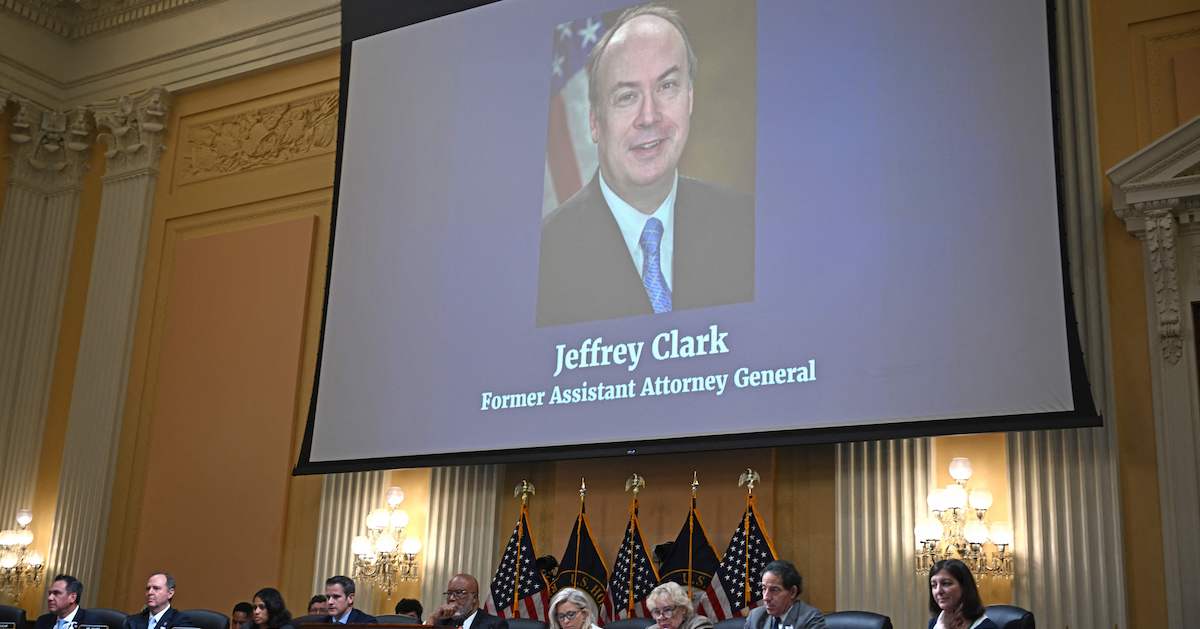
An image of ex-Assistant Attorney General Jeffrey Clark is seen on a screen during the fifth hearing by the Jan. 6th Committee in Washington, D.C., on June 23, 2022. (Photo by MANDEL NGAN/AFP via Getty Images)
Former Assistant Attorney General Jeffrey Clark, who tried to subvert the 2020 election results for Donald Trump, claims that he’s immune from ethics charges stemming from that effort — and that his superiors engaged in “dereliction of duty” for rejecting his conspiracy theories.
“Failing to conduct a federal investigation of irregularities that did or may have affected the outcome of the 2020 presidential election is a serious federal responsibility, not just a responsibility of state and local authorities or one that can be sloughed off onto the Trump campaign,” Clark’s attorney Charles Burnham wrote in a 30-page answer to the charges filed in the D.C. Court of Appeals. “Additionally, the U.S. Justice Department possesses not just criminal tools but civil enforcement tools.”
Those superiors, former Acting Attorney General Jeffrey A. Rosen and ex-Acting Deputy Attorney General Richard Donoghue, testified before the Jan. 6 Committee that Clark embraced a series of outlandish claims about the 2020 election. One of those theories held that election machines could be hacked by smart thermostats.
On Dec. 28, 2020, Clark referred to that idea into an email to Rosen and Donoghue, in which he attached a “draft letter” that would serve as a “Proof of Concept” for a proposed announcement to Georgia’s executive and legislative branch leaders of a Justice Department investigation into supposed “voting irregularities.” The letter, addressed to Gov. Brian Kemp (R) and the heads of both branches of the legislatures, never went out after Rosen and Donoghue refused to pursue it.
As recounted before the committee, Rosen, Donoghue and Steven Engel, the former Assistant Attorney General for the Office of Legal Counsel, reacted in such horror to the proposal that they threatened to resign if it were enacted. In the event of mass resignations, ex-White House lawyer Eric Herschmann warned Clark: “You’ve just admitted your first step or act you’d take as attorney general would be committing a felony.”
The filing submitted by Clark’s lawyer, however, asserts that their client is entitled to argue that he was right, and his superiors in the DOJ were wrong.
Clark “is entitled to show, as a defense to the allegations in the charges, that his superiors at the Justice Department engaged in a dereliction of duty in how they approached the election irregularities involved in the 2020 election,” the filing states.
His lawyers also argue that there is no plausible link between his actions and the Jan. 6 attack on the U.S. Capitol because the letter never became public until much later.
“Put differently and for example, no one could have marched on the Capitol in reliance on confidential advice given to the President based on publicly unknown policy deliberations not revealed until weeks after January 6,” the document says.
Clark also claims the matter already has been adjudicated before the then-GOP dominated Senate that acquitted Trump after the Democratic Party-dominated House impeached him.
“The lack of a finding of guilt is res judicata benefitting President Trump and any of his subordinates who may have agreed with him that the 2020 election was a proper subject to be questioned and investigated more thoroughly by the federal government,” the document says.
All told, the document asserts 54 defenses — several of which are shielded under redactions.
Read the filing, below: